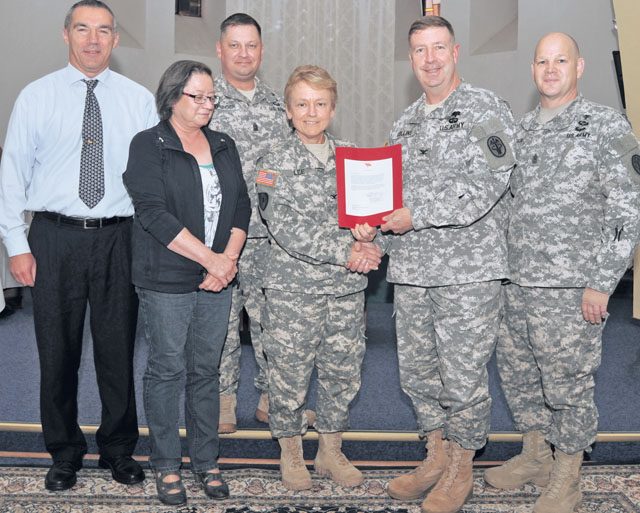
From left, Harry Raith, Henny Moll, Command Sgt. Maj. Timothy Sprunger, Col. Judith Lee, Col. John Collins and Sgt. Major Brian Stauffer receive the MEDCOM Exceptional Organizational Safety Award.
If you’re looking for excitement, best stay away from Landstuhl Regional Medical Center.
During 2012, no one died or suffered a permanent disability, there were no occupational illnesses or serious cases of property damage, and the number of injuries that did occur dropped from 94 to 76 compared with the previous year.
To the average patient or employee, such safety goes largely unnoticed. To the Army surgeon general, however, the accomplishment loomed large enough to bestow the MEDCOM Exceptional Organizational Safety Award to LRMC and the small army of people it takes to make bad things not happen.
“Today is a great day,” said Col. John Collins, the commander for Europe Regional Medical Command who made the Aug. 26 award presentation on behalf of Lt. Gen. Patricia Horoho, the surgeon general and commanding general for U.S. Army Medical Command.
“We’ve got to celebrate these times when we have victories like this,” Collins said. “Getting the MEDCOM Exceptional Organizational Safety Award is a huge deal, and I think long overdue for this great organization. LRMC embodies excellence in so many ways. This is just another demonstration of that excellence by a team of highly competent, skilled, dedicated and motivated people.”
In leading the LRMC pursuit of safety, Collins singled out LRMC Safety Manager Harry Raith, describing him as a “tremendous professional” and “incredible part of this institution for a long time who has helped keep us safe.”
Collins also lauded Henny Moll as a valuable, “quiet professional” in her behind-the-scenes role as the LRMC safety specialist.
Although he works in the LRMC Safety Office, Raith said the award is truly shared by the small army of LRMC professionals it takes to keep the largest U.S. hospitals outside the U.S. so safe, including
facility management, quality assurance, maintenance contractors, housekeeping, security, occupational health, industrial hygiene, works council, emergency management, medical maintenance, HAZMAT, preventive medicine, company commanders and first sergeants, infection prevention and control, fire marshall, and additional duty safety NCOs at Army health clinics in Belgium, Germany and Italy.
“Safety is about attitude,” Raith said. “LRMC has been fortunate to have team members with the right
attitude to create a safe environment. As a patient, you have the right to enter a medical treatment facility that is clean and safe.”


